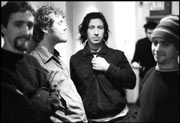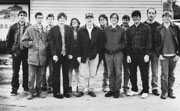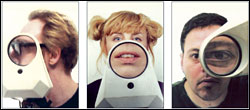THE FRAMES
THE WAXWINGS, YOUNG & SEXY
Crocodile Cafe, 441-5611, $10
9 p.m. Sat., Sept. 28
It’s 10:30 p.m. and I’m in a smoke-thick bar in Philadelphia nursing a bottle of Pabst Blue Ribbon and trying in vain to screen out the screaming noise of the local opening act in the room next door, when the woman seated to my left suddenly leans in close and yells into my ear: “Which band are you here to see?”
“The Frames,” I holler back. Her eyes go saucer shaped, and she grips my shoulder.
“They’re so good,” she says, leaning hard into the last two words.
It turns out that the woman lived for six months in the group’s native Ireland and fell in love with their music almost instantly. When I explain that I am at the show because I’m writing about the band, her tone changes from enthusiasm to consternation.
“You’d better say nice things about them,” she admonishes, knitting her brow and wagging a maternal finger at me. I smile a polite affirmative, and she leaves. I’m about to return my attention to the sweating bottle in front of me when I feel a tap on my other shoulder and so swivel to face the young lady sitting on my opposite side.
“Were you guys talking about the Frames?” she asks. I nod, and she lays a hand over her heart.
“They’re so good.”
THIS IS HOW it works with the Frames, the deft Irish pop group who’ve ballooned in stature by getting smaller and more personal in sound. After a three-record run as Bono-fied anthem grinders, the Frames reinvented themselves with last year’s stunning For the Birds, a brittle folk masterpiece full of regret and raw longing. Courageously abandoning their dependence on big, obvious dynamics, the Frames hang their hearts on the elemental: a single weeping violin line, an arpeggio that flutters down like snowfall. At a time when indie pop is peopled by heartbreaking twerps and swaggering geniuses, the Frames have won affection through nuance and restraint.
To hear frontman Glen Hansard tell it, though, the whole thing was a terrible mistake.
“Two weeks after we released it, I thought it was the worst record we had ever made and I wanted no part of it. The band talked me back in. The public’s reaction was a genuine revelation—people really seemed to connect with this record.”
Which is a colossal achievement for a band that had gone 10 long years without earning so much as polite applause.
Hansard’s career began at age 13, after he arrived at the sobering realization that school held no promise for him.
“I really wasn’t cut out for it,” he says. “My principal was a DJ, and whenever I got sent to him—which was often—we would sit and talk about Bob Dylan and Leonard Cohen. Eventually, he said to me, ‘You should leave school, Glen. It’s not for you.’ So that day, I left for the last time and went straight out busking.” After burning four years banging out Cure songs at busy intersections, Hansard took a loan from his mother and recorded a primitive demo. The tape attracted the interest of an Island Records exec, and Hansard quickly assembled the Frames to record a powder-keg debut, Another Love Song, with Pixies producer Gil Norton.
“It was not a great record,” Hansard flatly admits, “and I blame my love of the Pixies. If I hadn’t discovered Surfer Rosa, it may have been a country-folky sort of record. When it didn’t make money, we were dropped from the label.”
The group recorded two independent follow-ups, 1996’s Fitzcarraldo and 1999’s Dance the Devil, but neither of them cohered for more than a handful of songs. Exhausted and quickly growing cynical, the group signed with Chicago’s Overcoat Records in 2001 and set to work on their fourth attempt. But rather than fall back into routine, Hansard approached the situation pragmatically.
“We spent years knowing there was something wrong with the way we were doing things. For a long time, we had trusted an industry that’s only interested in one thing: cash. Ten years of not seeing any ourselves made us realize we need not listen to anyone anymore.”
And so the Frames set to work on For the Birds, a record that coolly inverted everything the group had done to that point.
“We set out to make the album as small as possible,” Hansard says. “It became a lesson in what not to play, an exercise in resistance. We found the best notes are the ones that are suggested.” The result is deeply, genuinely moving. Hansard’s quivering voice instills his desperate lyrics with a sense of yearning and brokenness. Whole songs pivot on his evocative phrase turns: “What Happens When the Heart Just Stops” doesn’t fully open up into its glorious mezzo-forte conclusion until Hansard wails, “There is a lie that drags us beating and bawling into disappointment.”
It’s as if Glen Hansard finally found a way to make the music mine the depths of his passion—by turning everything down.
At the show in Philadelphia, the crowd sways as if Hansard’s got them in a trance, and the whole room is crackling with anticipation as the band prepares to deliver the crushing crescendo that concludes “Headlong.” Out of the corner of my eye, I spot one of the women I talked to earlier. She catches me looking and nods, and as the two of us return our attention to the stage, a single thought emerges, crystallizing just as the final bars kick in and the whole place erupts in spontaneous applause:
She was right. The Frames are so good.







